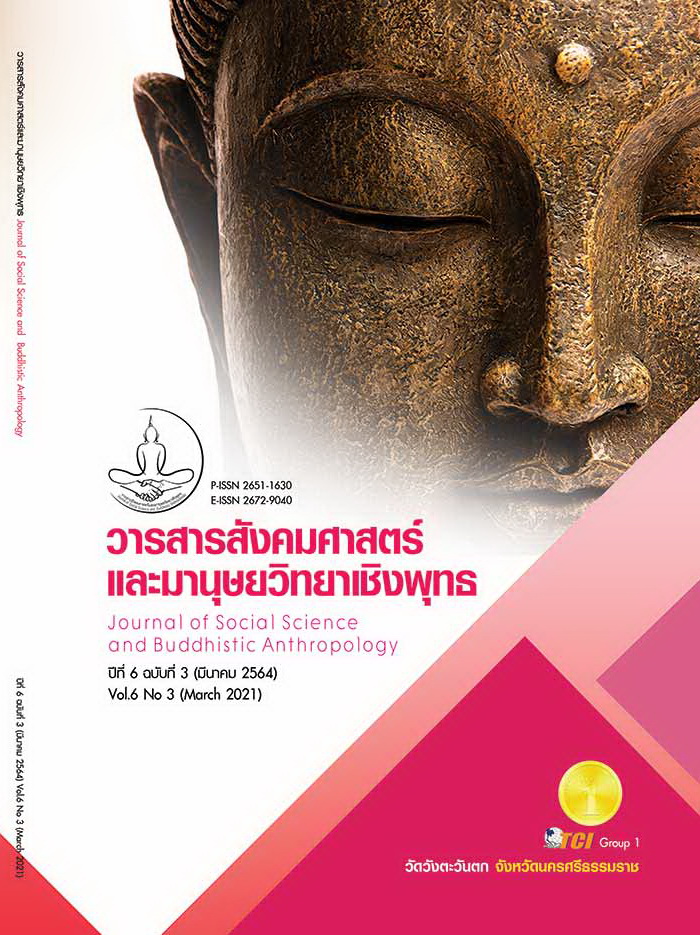THE MODEL OF FACTOR AFFECTING MANAGEMENT OF THE HOUSING ESTATE JURISTIC PERSONS IN NONTHABURI PROVINCE
Keywords:
Model of Factor, Efficiency in the Management, Housing Estate Juristic PersonsAbstract
The objectives of this article were to study: 1) the levels of the efficiency in the management of the housing estate juristic persons, leadership, good governance, motivations, and total quality management; and 2) the influences of leadership, good governance, motivations and total quality management on the efficiency in the management of the housing estate juristic persons. This research employed a quantitative method. The research sample consisted of 400 managers of the housing estate juristic persons in Nonthaburi province. The sample size was determined based on the criterion of 20 times the observed variables. They were selected via stratified sampling. Data analysed with a structural equation model. The findings showed that: 1) the efficiency in the management of the housing estate juristic persons, motivations, and total quality management were rated at a high level whereas leadership and good governance were rated at the highest level; and 2) leadership had the highest overall influence on the efficiency in the management of the housing estate juristic persons, followed by motivations, total quality management, and good governance, respectively. Research results Nonthaburi provincial land office. The findings can be used to guide policy making, to supervise the juristic person in accordance with the current problem and housing estate juristic person findings can be put into practice for more efficiency.
References
จิรุตม์ ศรีรัตนบัลล์. (2554). การบริหารจัดการบ้านเมืองที่ดี. กรุงเทพมหานคร: สถาบันวิจัยระบบสาธารณสุข.
ชิษณุพงศ์ ทองพวง. (2556). องค์ประกอบการบริหารคุณภาพทั่วทั้งองค์การของมหาวิทยาลัยเอกชนในประเทศไทย. ใน ดุษฎีนิพนธ์ปรัชญาดุษฎีบัณฑิต สาขาวิชาการจัดการภาครัฐและเอกชน. มหาวิทยาลัยคริสเตียน.
ธงชัย สันติวงษ์. (2553). ทฤษฎีองค์การและการออกแบบองค์การ. กรุงเทพมหานคร: ไทยวัฒนาพานิช.
บุญใจ ศรีสถิติรากูร. (2557). การบริหารคุณภาพทั่วทั้งองค์การ. กรุงเทพมหานคร: พิมพ์ลักษณ์.
บุญสืบ โพธิ์ศรี. (2559). ธรรมาภิบาลในสถานศึกษา. กรุงเทพมหานคร: ไทยวัฒนพาณิช.
มินตรา จันทร์เสถียร. (2559). การจัดการคุณภาพทั่วทั้งองค์การ. กรุงเทพมหานคร: ไทยวัฒนาพพานิช.
มุตตา คงคืน. (2551). ธรรมาภิบาลของผู้บริหาร. กรุงเทพมหานคร: มหาวิทยาลัยบูรพา.
วิภาดา คุปตานนท์. (2554). การจัดการและพฤติกรรมองค์การ. กรุงเทพมหานคร: มหาวิทยาลัยรังสิต.
วิภาส ทองสุทธิ์. (2551). การบริหารจัดการที่ดี. กรุงเทพมหานคร: อินทภาษ.
วิวัธน์ ศรีเจริญวงศ์ และพัลลภ กฤตยานวัช. (2560). กฎหมายอาคารชุด และการบริหารนิติบุคคลอาคารชุด. กรุงเทพมหานคร: มาสเตอร์ คีย์.
วีรวุธ มาฆะศิรานนท์. (2560). การบริหารองค์กรคุณภาพ. กรุงเทพมหานคร: พิมพ์ลักษณ์.
สำนักงานที่ดินจังหวัดนนทบุรี. (2562). การร้องเรียนหมู่บ้านจัดสรร. กรุงเทพมหานคร: กระทรวงมหาดไทย.
สุจิตรา ธนานันท์. (2552). การพัฒนาทรัพยากรมนุษย์. (พิมพ์ครั้งที่ 4). กรุงเทพมหานคร: สถาบันบัณฑิตพัฒนบริหารศาสตร์.
สุภัททา ปิณฑะแพทย์. (2561). พฤติกรรมมนุษย์กับการพัฒนาคน. กรุงเทพมหานคร: พิมพ์ลักษณ์.
อรพิน ชูชม. (2555). แรงจูงในในการทำงาน. จิตวิทยา, 2(2), 52 – 61.
Bass. B. M. (1985). Leadership and performance beyond expectations. New York: The Free Press.
Blake, R. R. & Mouton, J. S. (1994). The managerial grid Houston. TX: Gulf Publishing.
Dean, J. W. & Evans, J. R. (1994). Total quality: Management, organization, and strategy. St Paul. Minnesota: West Publishing.
Drucker, P. F. (2003). Peter Drucker on the Profession of Management. Boston, MA: Harvard Business Review Press.
Dubrin, A. (1998). Leadership research finding: Practice and Skills. Boston, Houghton: Mifflin.
Goetsch, D. L. & Davis, S. (1994). Introduction to total quality: Quality, productivity, competitiveness. New York: Maxwell Macmillan.
Ishikawa, K. (1985). What is total quality control: The Japanese way. Englewood Cliffs, NJ: Prentice-Hall.
Ivancevich, J. M. (2008). Human resource management. (8th ed). New York: McGraw-Hill.
James, L. R. & Jones, A. P. (1994). Organizations climate: A review of theory and research. Psychological Bulletin, 81(1), 1096-1112.
Kline, R. B. (2005). Principles and practice of structural equation modeling. New York: Guilford Publications.
Milkovich, G. M. & Newman, J. M. (2005). Compensation. (8th ed). New York: McGraw-Hill/Irwin.
Oakland, J. S. (1993). Total quality management. Oxford: Butterworth-Heinemann.
Schermelleh-Engel, K. et al. (2003). Evaluating the fit of structural equation models: Tests of significance and descriptive goodness-of-fit measures. Methods of Psychological Research Online, 8(2), 23-74.
Sureshchandar, G. S. et al. (2001). Customer perceptions of service quality: A critique. Total Quality Management, 12(1), 111-124.









